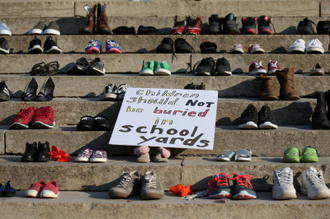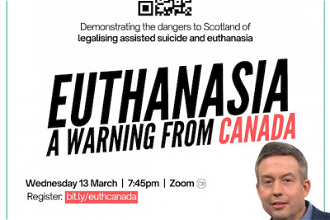Canadian Residential Schools Settlement

The Canadian government is releasing thousands of records detailing historic events at residential schools for indigenous children run by the Catholic Church. It has also reached a legal settlement with the Assembly of First Nations as compensation for decades of policies that discriminated against Canada's original inhabitants. This settlement is separate from any legal action that might arise from the discovery of scores of children's graves on Church property in 2021.
For more than 80 years, Churches (including Catholic, Anglican, Methodist, Presbyterian and United denominations) were responsible for educating and caring for thousands of indigenous children who were removed from their parents as the Canadian government attempted to eradicate their culture. Many suffered mistreatment, torture and even death in the institutions.
Following a complaint filed with the Canadian Human Rights Tribunal and a class action lawsuit, the federal government will commit $20 billion to reforming the First Nations' welfare system and a further $20 billion providing compensation to those who faced abuse and discrimination in the system.
A delegation was hoping to meet Pope Francis at the Vatican in December, in advance of a planned visit to Canada. However, the trip was cancelled due to Omicron.
Where does the scandal leave the Catholic Church in Canada?
In an unscientific opinion survey, I found Canadian Catholics were less forgiving of their Church than non-Catholics. Christians of other denominations and non-believers attached equal blame to the Canadian government and the Churches running the residential schools. One non-Catholic told me: "I blame the government 100%. I'd actually forgotten about the church's involvement." Yet, a regular Catholic Church-goer said, "I'm still grappling with the horrors committed by the religious orders of the Church. I think the blame is 50/50."
A non-Catholic commented: "People are more likely to blame the government than the Church, but the churches are not off the hook. People realise this was just another thing that the government did to try to get rid of the indigenous population. Since the Truth and Reconciliation report was released, there is more of an understanding of what wrongs were done. Reconciliation efforts are in place, and not just by government and Churches but all sectors including companies, media, etc. They are educating themselves and decolonising their organizations....it is not just the government (thankfully!)"
For a non-Catholic Torontonian, the Catholic Church's position on the right to life left it open to mockery after it was revealed that indigenous children were sexually abused, impregnated and their newborn babies thrown on fires. "They could have nurtured and loved these kids, yet they terrorized them and were responsible for many deaths. The Church's behaviour was the exact opposite of the Christian values they preach." However, she wondered why Canadian officials had not reacted when it must have been obvious that systematic abuse was occurring.
There is skepticism about how the $40 billion settlement, the largest in Canadian history, will be handled. "Who knows how fairly and honestly these funds will be distributed?" asked a non-Catholic Torontonian I contacted. "Inevitably, there will be misuse and corruption."
However, Catholics interviewed for this article thought it was vital to have monetary restitution by both the government and the Catholic Church. "There's a need for money, not just words of acknowledgement." Years ago, the Canadian Catholic Bishops Conference was ordered to pay $25 million in compensation. However, the bishops said they could not raise the funds necessary, and the obligation was dropped.
For some, the sense of outrage at the discovery of bodies is fresh, although the issue has faded from the headlines. "Many of us put symbolic children's shoes outside Churches or in our windows to show solidarity with indigenous Canadians," said a Torontonian.
According to one non-Catholic, the settlement should be used to produce a museum-quality exhibition to travel across the country, educating citizens about what was done in the name of the government. A permanent exhibition at a national museum, and monuments at the sites of the residential schools were also suggested.
Does apology and financial compensation help?
In recent years there have been truth and reconciliation processes in post-Communist Europe, in post-Apartheid South Africa (headed by the late Desmond Tutu), in the years following the Rwandan genocide and in Northern Ireland, among other places.
In the case of Rwanda, those accused of atrocities had to appear before a traditional community council called a gacaca. Perpetrators were expected to confess, if not apologise. A survivor told me that at gacaca she confronted the man who killed her husband and children in 1994. He did confess but he vowed he would never reveal where he had buried the bodies. "He knew that was the way he could hurt me the most," she said. "He was aware he could stop me from ever having closure."
For others, a process of accountability and acknowledgement is an essential step on the road to recovery. According to one Canadian survivor of childhood abuse: "Seeing my attacker confessing in court was important because the world could witness that what happened to me wasn't my fault. And the money awarded to me was an acknowledgement by the government that no one had protected me. It helps."
Ground penetrating equipment has been distributed to First Nations communities where there were residential schools. When the earth thaws in the spring, the search will begin again. Then First Nations representatives will have to decide how to repatriate the bodies, identify them and honour them.


















